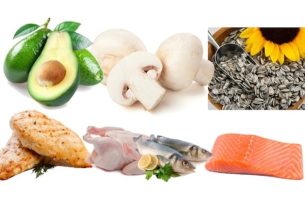Vitamin C, or ascorbic acid, is a vitamin that acts as an antioxidant and strengthens the immune system, in addition to stimulating the absorption of iron from food.
The main foods rich in vitamin C are fruits, vegetables and legumes, such as pineapple, cashews, broccoli, lemon, kiwi and tomatoes. Furthermore, this vitamin can also be found in supplements, which are sold in pharmacies and health food stores, and which should only be used under the guidance of a doctor or nutritionist.
A low intake of vitamin C favors the emergence of scurvy, a disease that can cause signs and symptoms, such as bleeding and swelling of the gums, tiredness and muscle pain. Understand what it is and learn about other symptoms of scurvy.

What is vitamin C for?
The main health benefits of consuming vitamin C are:
1. Maintains skin health
Vitamin C is a powerful anti-inflammatory and antioxidant that promotes the production of collagen, a protein that participates in the formation and regeneration of the skin, helping with wound healing.
By participating in the production of collagen, vitamin C also helps maintain the firmness and elasticity of the skin, preventing the appearance of stretch marks, wrinkles and sagging. Discover more foods that help prevent sagging and wrinkles.
2. Helps fight anemia
Vitamin C helps combat anemia, because it favors the absorption of iron present in food, helping in the formation of hemoglobin, one of the components of red blood cells that is responsible for transporting oxygen throughout the body and which is normally reduced in anemia.
3. Strengthens the immune system
Regular consumption of vitamin C strengthens the immune system, because it improves the functions of the body’s defense cells, helping to fight microorganisms such as viruses, bacteria and fungi, preventing situations such as flu, colds and allergies, for example.
4. Lowers “bad” LDL cholesterol
Vitamin C helps reduce “bad” cholesterol levels, LDL, in the blood, preventing the emergence of diseases such as atherosclerosis, stroke or heart attack. This can be explained by the antioxidant properties of this vitamin, which inhibits the oxidation of fat cells in the body.
5. Blood pressure control
Vitamin C has antioxidant properties that promote increased levels of nitric oxide in the body, a substance that promotes the relaxation of blood vessels, improving blood circulation and helping to control blood pressure.
6. May help prevent cancer
Thanks to its potential antioxidant effect, vitamin C has been associated with a reduced risk of some types of cancer, such as lung, colon, stomach, breast and prostate. Understand how antioxidants can help prevent cancer.
However, it is important to highlight that more studies are needed to confirm this benefit of vitamin C, both in the prevention and treatment of cancer.
7. Promotes memory and cognition
Vitamin C is essential for the production and release of dopamine, a neurotransmitter that helps increase feelings of pleasure and improve sleep, mood, memory and learning.
In addition, vitamin C is a potent antioxidant that protects nervous system cells against damage caused by free radicals, reducing oxidative stress and inflammation, and may help prevent diseases such as dementia, Alzheimer’s and Parkinson’s disease, for example. example.
Foods rich in vitamin C
The main foods rich in vitamin C are fruits, such as lemon, cashew, acerola, guava and pineapple; vegetables, such as tomatoes, peppers and carrots; and vegetables, such as broccoli, spinach and arugula.
Discover a more complete list of foods rich in vitamin C.
Daily amount of vitamin C
The recommended daily amount of vitamin C varies according to age and gender, according to the following table:
In addition, women up to 18 years of age and who are breastfeeding need to ingest 115 mg of vitamin C per day. For women who breastfeed and are between 19 and 50 years old, the recommendation for vitamin C is 120 mg per day.
However, there are some situations in which the body needs greater amounts of vitamin C. For example, smokers should ingest 35 mg more vitamin C than the recommended amount according to age and gender. Furthermore, situations such as diarrhea and surgery can also increase vitamin C needs.
Excess vitamin C
Excess vitamin C usually occurs due to high intake of supplements and can cause symptoms such as diarrhea, nausea, vomiting, abdominal pain and allergic reactions. Therefore, it is recommended to use vitamin C supplements only under the guidance of a doctor or nutritionist. Here’s how to take vitamin C supplements.
Vitamin C deficiency
Vitamin C deficiency occurs when you ingest less than 10 mg of this vitamin per day, for a period of 4 to 6 months, and can cause scurvy, a disease that causes signs and symptoms, such as delayed growth in children, red and purple spots skin, gum inflammation and tiredness. Learn about other signs and symptoms of low vitamin C.

Sign up for our newsletter and stay up to date with exclusive news
that can transform your routine!
Warning: Undefined array key "title" in /home/storelat/public_html/wp-content/plugins/link-whisper-premium/templates/frontend/related-posts.php on line 12
Warning: Undefined array key "title_tag" in /home/storelat/public_html/wp-content/plugins/link-whisper-premium/templates/frontend/related-posts.php on line 13




